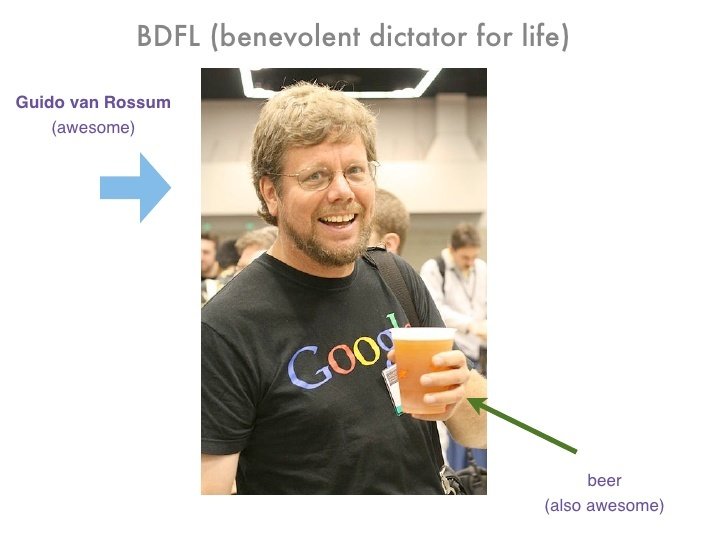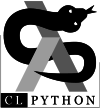Python
Python History
December 1989

Python 1.0 - January 1994

Python 2.0 - October 2000
+List Comprehensions
+Garbage Collection
+Nested Scopes (2.2)
+Type Unification (2.2)
+Generators (2.2)
Python 3.0 - December 2008

print => print()
"There should be one— and preferably only one —obvious way to do it"


Python Flavours
Brython

Python => Javascript
pyjs

Python => Javascript
RapydScript

Python => Javascript
CLPython

Python <=> Lisp
HotPy

High Performance Virtual Machine
IronPython

Python <=> .NET
Jython

Python <=> Java
PyMite

'flyweight', python-on-a-chip
PyPy

RPython + JIT == Speed!
tinypy

Python < 64Kb
CPython

The default
Getting Started
Installing
https://www.anaconda.com/
Running a program
$ python hello.py
Hello World!REPL
$ python
Python 2.6.6 (r266:84292, Nov 21 2013, 10:50:32)
[GCC 4.4.7 20120313 (Red Hat 4.4.7-4)] on linux2
Type "help", "copyright", "credits" or "license" for more information.
>>> print('Hello World!')
Hello World!
>>>
IPython jupyter
$ ipython
Python 3.4.3 (default, Feb 25 2015, 21:28:45)
Type "copyright", "credits" or "license" for more information.
IPython 3.0.0 -- An enhanced Interactive Python.
? -> Introduction and overview of IPython's features.
%quickref -> Quick reference.
help -> Python's own help system.
object? -> Details about 'object', use 'object??' for extra details.
In [1]:IDLE
$ idle
PyCharm

And more...
- Visual Studio Code
- Sublime Text
- Vim
- Atom
- Jupyter Notebook
- Eclipse + PyDev + LiClipse
- GNU Emacs
- Spyder
- Thonny
- ...
Jupyter Notebook
also runs Julia, and R...

Python Execution Model

Python Virtual Machine
find.pyc
draw.pyc
*.pyc
Python VM
OS
hardware
find.py
draw.py
*.py
Python interpreter
Python Paradigms
Imperative
Telling the "machine" how to do something, and as a result what you want to happen.
def print_even_numbers (list_of_numbers):
for x in list_of_numbers:
if x % 2 == 0:
print x
else:
print False
print_even_numbers(natural_numbers)natural_numbers = [0,1,2,3,4,5,6,7,8,9]Functional
Telling the "machine" what you want to happen.
def even_number (x):
return (x % 2) == 0
print(map(even_number, natural_numbers))natural_numbers = [0,1,2,3,4,5,6,7,8,9]Object Oriented

hello.py
# Python 2
print 'Hello World!'hello.py
# Python 3
print('Hello World!')whitespace counts
whitespace counts
Python Data Types
Numbers
- int
- float
- complex
Numbers
x = 40 + 42.67
y = int(67.879)
z = float(12)
print(x + y) # sum of x and y
print(x - y) # difference of x and y
print(x * y) # product of x and y
print(x / y) # quotient of x and y
print(x // y) # floored quotient of x and y
print(x % y) # remainder of x / y
print(abs(x)) # absolute value or magnitude of x
print(int(x)) # x converted to integer
Strings
- Strings are a list of characters.
- A single character is a string (list) of length 1.
- Use len() to check for length
name = 'python'
list(name) # ['p', 'y', 't', 'h', 'o', 'n']
name + name # 'pythonpython'
name * 3 # 'pythonpythonpython'
len(name) # 6Strings
-
string[n] gives the character at the nth position.
-
Since strings are lists, you can iterate over them
# Get character at position n, 0-based
name[1]
# Iterate over a string
for character in name:
print(character)Strings
- Membership tests
name = 'python rocks!'
'p' in name # True
'z' in name # False
'rock' in name # TrueStrings
- Use string variables
print('My name is %s and my weight is %f kg.' % (name, 78.8))Strings
- multi-line strings with triple quotes
str = """ The big brown fox
quickly jump ed over the wall
and ran away.
"""Strings
- Raw strings
print(r"Use \n fox new line")Strings
- f-strings (PEP 498)
company = "Kontali"
print(f"Welcome to {company}!")Strings
- re is for regex
- .join() joins
import re
m = re.search('(?<=-)\w+', 'spam-egg')
m.group(0) # 'egg'
filename = 'foo'
extension = 'log'
'.'.join([filename, extension]) # 'foo.log'Lists
- A list is a mutable collection of heterogenous items.
emptyList = []
['Hello'] * 4 # ['Hello', 'Hello', 'Hello', 'Hello']
languages = ['C', 'C++', 'Java', 'JavaScript', 'Elixir']
languages.append(['F#', 'C#']) # adds a list to the list
languages.extend(['Kotlin', 'TypeScript', 'Python']) # extends the list with the contents of a listLists
- Membership tests
'Python' in languages # returns True
'python' in languages # returns FalseLists
- Sort with sorted()
beatles = ['McCartney', 'Lennon', 'Starr', 'Harrison']
sorted(beatles)
sorted(beatles, reverse=True)
Lists
- Python lists are heterogenetic. (data of different types can be stored.)
mixed_list = [12, 'Oslo', 67.65, complex(34, 56)]List comprehensions
squares = []
for x in range(10):
squares.append(x**2)
squares = [x**2 for x in range(10)]- Make new lists based on some condition
List comprehensions
# returns square of 0-9 if number is even
squares = [x**2 for x in range(10) if x %2==0 ]- if and for
# combines the elements of two lists if they are not equal
notEqualCombinations = [(x, y) for x in [1,2,3] for y in [3,1,4] if x != y]Tuples
- A tuple is a list, but an immutable list
myList = ['a', 'b', 'mpilgrim', 'z', 'example']
myTuple = ('a', 'b', 'mpilgrim', 'z', 'example')
myList[3] = 'c' # ['a', 'b', 'mpilgrim', 'c', 'example']
myTuple[3] = 'c'
Traceback (most recent call last):
File "<stdin>", line 1, in <module>
TypeError: 'tuple' object does not support item assignmentNamed Tuples
- A namedtuple is a tuple with names
from collections import namedtuple
Station = namedtuple("Station", "id, city, state, lat, long")
tokyo = Station(999, "Dallas", "TX", "32.79°N", "96.77°W")
tokyo
# Station(id=999, city='Dallas', state='TX', lat='32.79°N', long='96.77°W')
tokyo.city
# 'Dallas'
import json
json.dumps(tokyo._asdict())
#'{"id": 999, "city": "Dallas", "state": "TX", "lat": "32.79\\u00b0N", "long": "96.77\\u00b0W"}'Dictionaries
- A dict is a mutable associative array (a.k.a. 'map')
- Think of it as an unordered set of key:value pairs
europe = {'sweden':'stockholm', 'norway':'oslo', 'finland':'helsinki', 'denmark':'copenhagen'}
europe['france'] = 'paris'
europe.get('norway')
Dictionaries
- Membership tests
'sweden' in europe # returns True
'china' in europe # returns False
Dictionaries
- Define your own sorting method
movies = {'The Game of Shadows': [129, 'Mystery', 'Guy Ritchie', 2011],
'The Dark Knight': [126, 'Action', 'Christofer Nollan', 2008],
'Sherlock Holmes': [128, 'Mystery', 'Guy Ritchie', 2009],
'Interstellar': [169, 'SciFi', 'Christofer Nolan', 2014]}
sorted(movies) # returns movies sorted by title
def get_sort_key(value):
return value[3]
sorted(movies.values(), key=get_sort_key) # returns movies sorted by yearDict Comprehensions
- Make new dicts based on some condition
movies = {'The Game of Shadows': [129, 'Mystery', 'Guy Ritchie', 2011],
'The Dark Knight': [126, 'Action', 'Christofer Nollan', 2008],
'Sherlock Holmes': [128, 'Mystery', 'Guy Ritchie', 2009],
'Interstellar': [169, 'SciFi', 'Christofer Nolan', 2014]}
newMovies = { key: value for key, value in movies.items() if value[3] > 2010 }Python Idioms
Loops
index = 0
while index < len(names):
print (names[index])
index+=1for name in names:
print namenames = ['Larry', 'Moe', 'Curly']Enumerate
count = 0
for name in names:
print(count, name)
count += 1for count, name in enumerate(names):
print(count, name)names = ['Larry', 'Moe', 'Curly']for count, name in enumerate(names, start=1):
print(count, name)String Chaining
my_long_text = "We are no longer the knights who say Ni! We are now the knights who say ekki-ekki-ekki-p'tang-zoom-boing-z'nourrwringmm!"my_long_text = ("We are no longer the knights who say Ni! "
"We are now the knights who say ekki-ekki-"
"ekki-p'tang-zoom-boing-z'nourrwringmm!")Duck Typing
if 'x' in d and isinstance(d['x'], str) and d['x'].isdigit():
value = int(d['x'])
else:
value = Nonetry:
value = int(d['x'])
except (KeyError, TypeError, ValueError):
value = Noned = {'x': '5'}Importable and Executable
if __name__ == '__main__':def main():
print('Doing stuff in module', __name__)
if __name__ == '__main__':
print('Executed from the command line')
main()Modules
Modules
- Python files that can contain variables, functions and classes.
- Can be used in another python file by using ”import” and ”from”.
- Import gives access to all in the imported module.
- From allows for the selected usage.
Modules
# utility.py
pi = 3.14285
def get_circle_area(radius):
return pi * radius**2
# circle.py
import utility
print(utility.pi)
print(utility.get_circle_area(10))
# circle.py
from utility import get_circle_area
print(get_circle_area(10))
to use everything in utility.py:
to use only a specific method from utility.py:
Objects
Object References
- All data in a Python program is represented by objects or by relations between objects
Object References
int a = 1;
Not Python:
Object References
int a = 2;
Not Python:
Object References
int b = a;
Not Python:

Object References
a = 1
Python:
Object References
a = 2
Python:

Object References
b = aPython:

Classes and Objects
Classes and Objects
class Salmon:
animal_type = "fish" # Class variable
location = "ocean" # Class variable
# Constructor method with instance variables name and age
def __init__(self, name, age):
self.name = name
self.age = age
def main():
sammy = Salmon("Sammy", 4)
print(f'{sammy.name} is a salmon that lives in the {sammy.location}')
stevie = Salmon("Stevie", 3)
print(f'Another salmon is {stevie.name} who is {stevie.age} years old')
if __name__ == "__main__":
main()
Functions
Functions
- Setting default values
def get_full_name(fname, lname='Andersson'):
return fname + ' ' + lname
get_full_name('Nisse')
get_full_name('Nisse', 'Pettersson')
Functions
- Passing arguments
def add(a, b, c, d):
return a + b + c + d
add(4, 7, 8, 2) # Values are assigned by positions
add(b=42, c=45, d=87, a=34) # Values are assigned by argument names or keyword names
add(32, 67, d=66, c=12) # Mix of the above
Functions
- Passing arbitrary arguments
def foo(*args):
print(args) # args is a tuple that collects all the incoming arguments
foo(34, 56, 78)Functions
- Passing arbitrary key:value arguments
def foo(**kwargs):
print(kwargs) # kwargs is a dictionary. This works only for keyword-value based calls
foo(fname='John', lname='Doe')
Functions
- Hybrid arguments
def foo(a, b, *args, **kwargs):
print(a)
print(b)
print(args)
print(kwargs)Pass by value or reference?
- Neither. Python uses pass-by-object-reference
- Depends on mutable or imutable object
Pass by value or reference?
- Immutable object
def change_value(value):
value = 42
some_value = 50
print(some_value) # 50
change_value(some_value)
print(some_value) # 50Pass by value or reference?
- Mutable object
def change_list(some_list):
some_list.append(42)
another_value = [1, 2, 3, 4, 5]
print(another_value) # [1, 2, 3, 4, 5]
change_list(another_value)
print(another_value) # [1, 2, 3, 4, 5, 42]
Special
Function Constructs
Generator Functions
- Yield saves state and returns a value when next() is called
def get_even(number):
while True:
if number % 2 == 0:
yield number
number += 1
>>> generator = get_even(33)
>>> generator.next()
34
>>> generator.next()
36Decorator Functions
def heading(func):
def wrapper(name):
return "<h1>{0}</h1>".format(func(name))
return wrapper
@heading
def greet(name):
return "Hello {0}, i hope you are well!".format(name)
print greet("John Doe") # <h1>Hello John Doe, i hope you are well!</h1>
You can also execute the wrapped function, giving you the ability to do something before and after the function executes.
Functional Programming
Functional Programming
- Map
items = [1, 2, 3, 4, 5]
def sqr(x):
return x ** 2
list(map(sqr, items)) # [1, 4, 9, 16, 25]Map takes a function and a collection of items. It makes a new, empty collection, runs the function on each item in the original collection and inserts each return value into the new collection. It returns the new collection.
Functional Programming
- Reduce
items = [0, 1, 2, 3, 4]
def add(a,x):
return a + x
sum = reduce(add, items) # 10Reduce takes a function and a collection of items. It returns a value that is created by combining the items.
Functional Programming
- Filter
items = [-5, -4, -3, -2, -1, 0, 1, 2, 3, 4]
def negative(x):
if x < 0:
return x
list(filter(negative, items)) # [-5, -4, -3, -2, -1]Filter takes a function and a collection. It returns a collection of every item for which the function returned True.
Functional Programming
- Higher order functions
def twice(function, x):
return function(function(x))
def f(x):
return x + 3
twice(f, 7) # 13
higher-order functions are functions that can accept other functions as arguments and return functions to the caller.
Functional Programming
- Anonymous functions (a.k.a. Lambda functions a.k.a. Literal functions)
def square(x):
return x**2
square(8) # 64
(lambda x: x**2)(8) # 64
An anonymous function is a function definition that is not bound to an identifier.
To Python or not to Python?
Python?
def fizzbuzz(number):
if number % 3 == 0 and number % 5 == 0:
return 'FizzBuzz'
elif number % 3 == 0:
return 'Fizz'
elif number % 5 == 0:
return 'Buzz'
else:
return number
for number in range(1, 101):
print fizzbuzz(number)Java?
import sys
class Value(object):
def __init__(self,value):
self.setValue(value)
def setValue(self,value):
self.value = value
def getValue(self):
return self.value
def toString(self):
return self.getValue().__str__()
class FizzBuzz(object):
def __init__(self, n):
if n % 15 == 0:
value = 'FizzBuzz';
elif n % 3 == 0:
value = 'Fizz';
elif n % 5 == 0:
value = 'Buzz';
else:
value = str(n);
self.setValue(value);
def setValue(self,value):
self.value = Value(value);
def getValue(self):
return self.value;
class FizzBuzzRunner(object):
def __init__(self, n):
self.setN(n)
def setN(self, n):
self.n = n
def run(self):
for i in range(1,self.n):
sys.stdout.write(FizzBuzz(i).getValue().toString()+'\n');
if __name__ == '__main__':
n = 101;
FizzBuzzRunner(n).run()C?
def main():
i = 0;
value = '';
while i < 100:
i += 1
if i % 15 == 0:
value = 'FizzBuzz';
elif i % 3 == 0:
value = 'Fizz';
elif i % 5 == 0:
value = 'Buzz';
else:
value = str(i);
print value;
return 0;
main();Clojure?
def fizzbuzz(n):
return 'FizzBuzz' if n % 3 == 0 and n % 5 == 0 else None
def fizz(n):
return 'Fizz' if n % 3 == 0 else None
def buzz(n):
return 'Buzz' if n % 5 == 0 else None
def fizz_andor_maybenot_buzz(n):
print fizzbuzz(n) or fizz(n) or buzz(n) or str(n)
map(fizz_andor_maybenot_buzz, xrange(1, 101))Lisp?
fizzbuzz = lambda n: 'FizzBuzz' if n % 3 == 0 and n % 5 == 0 else None
fizz = lambda n: 'Fizz' if n % 3 == 0 else None
buzz = lambda n: 'Buzz' if n % 5 == 0 else None
fizz_andor_maybenot_buzz = lambda n: fizzbuzz(n) or fizz(n) or buzz(n) or str(n)
print reduce(lambda m,n: m+'\n'+n, map(fizz_andor_maybenot_buzz, range(1, 101)))Testing
Unit Testing
# utility.py
class Utility:
def add(self, a, b):
return a+b
def sub(self, a, b):
return a-b
def multiply(self, a, b):
return a*b
Unit Testing
# test_utility.py
import unittest
from utility import Utility
class TestUtility(unittest.TestCase):
util = None
def setUp(self):
self.util = Utility()
def tearDown(self):
self.util = None
def test_add_with_positive_values(self):
a = 10
b = 20
expected_value = 30
actual_value = self.util.add(a, b)
self.assertEquals(expected_value, actual_value)
def test_add_with_positive_and_negative_values(self):
a = -10
b = 20
expected_value = 10
actual_value = self.util.add(a, b)
self.assertEquals(expected_value, actual_value)
if __name__ == "__main__":
unittest.main()
PEPs
PEP 8
Style Guide for Python Code
PEP 257
Docstring Conventions
PEP 3132
Extended Iterable Unpacking
Python Gotcha's
Forgetting Parenthesis
# Correct
foo.close()# Incorrect, but no error :(
foo.closeGIL
The global interpreter lock, or GIL, is a mutex that prevents multiple native threads from executing Python bytecodes at once
Mutable Default Arguments
Python’s default arguments are evaluated once when the function is defined, not each time the function is called. This means that if you use a mutable default argument and mutate it, you will and have mutated that object for all future calls to the function as well.
Late Binding Closures
def create_multipliers():
return [lambda x : i * x for i in range(5)]
for multiplier in create_multipliers():
print(multiplier(2))
# expected
0
2
4
6
8# actual
8
8
8
8
8whenever any of the returned functions are called, the value of i is looked up in the surrounding scope at call time. By then, the loop has completed and i is left with its final value of 4.
Dependencies
pipeasy_installvirtualenv
- pipenv
Nice Libs
Requests
import requests
response = requests.get('https://www.ssb.no/eksport/tabell.csv?key=435931')
Numpy
For all your N-dimensional array needs...
Pandas
import pandas as pd
df = pd.read_json('http://www.openfisheries.org/api/landings.json')
df.head()Matplotlib
import matplotlib.pyplot as plt
import numpy as np
np.random.seed(19680801)
data = np.random.randn(2, 100)
fig, axs = plt.subplots(2, 2, figsize=(5, 5))
axs[0, 0].hist(data[0])
axs[1, 0].scatter(data[0], data[1])
axs[0, 1].plot(data[0], data[1])
axs[1, 1].hist2d(data[0], data[1])
plt.show()
Let's play!
Set the stage...
from IPython.core.display import display, HTML
display(HTML("<style>.container { width:100% !important; }</style>"))Check the weather..
import requests
city = 'name of your city'
resp = requests.get(f'https://wttr.in/{city}')
print(resp.text)Download a data-set
https://www.scrfa.org/database/Search-Results.php
new notebook...
import pandas as pd
from pandas_profiling import ProfileReport
data = pd.read_csv('data/fish.csv')
profile = ProfileReport(data, title="Sample Report")
profileZen of Python
(PEP 20)
import thisPower of Python
(xkcd)
import antigravityTadaaa !
Python
By maderskog
Python
- 813



